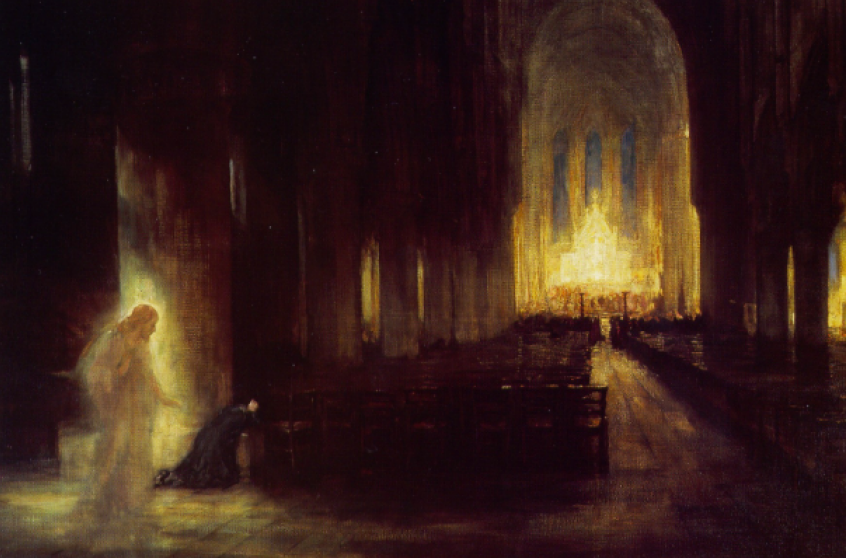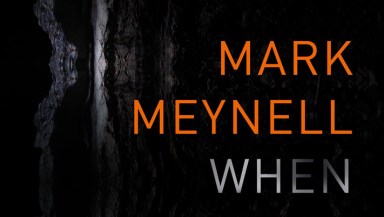It's not every day that you find yourself talking to an evangelical preacher who confesses to daily mental suffering. But Mark Meynell has the air of a true grown-up. Having struggled for many years with depression, a word he says does not do justice to what he has felt at times, this uniquely honest minister has just produced a powerful and timely memoir, When Darkness Seems My Closest Friend (IVP).
Meynell is director for Langham Preaching and Langham Partnership, with responsibility for Europe and the Caribbean, and for nine years he worked on the senior ministry team at All Souls Langham Place, London. Previously he had taught biblical studies at a seminary in Kampala, Uganda.

The book begins with a dramatic description of his being in Uganda on the verge of returning back to the UK in 2005 when, to the horror of Meynell and his wife Rachel, the London terrorist attack of '7/7' unfolded – an event that would help lead to Meynell being diagnosed with post traumatic stress disorder (PTSD).
Since then, he has battled with what Churchill famously called his 'black dog,' a term Meynell relates to because 'it's like there is a presence'. 'Depression', he says, is inadequate: 'I think because it's in such common parlance. You can't regulate how language is used, so you say "I'm feeling a bit depressed because I missed my train" – and that's fine, but what that means, is it renders it useless for describing genuine ill-health. So my quest if you like, has been to find vaguely adequate language and metaphors tend to be the primary means for doing that.'
Today, he says, he's 'OK' – though the thought of his condition being out there for everyone is daunting.
'I think the actual emergence of the book is not straightforward because up until now it's all been people I already know who've been reading bits.
'So suddenly when it's out there, that's a whole different ball game. But I'm absolutely certain it's the right thing to do. I think the thing I'm most nervous of is becoming the depression go-to guy. I can't do that. I just can't do that.'
Though on the other hand, writing has itself been a help to him. 'The prompting for doing it was more therapeutic, and the need to find my own language to describe stuff. And just because of the way I operate for whatever reason I find it easier to put stuff down on paper.
'There is so much out there for those in the midst of it is actually counter-productive and unhelpful.'
Which brings us straight onto what Meynell thinks about those evangelicals, particularly in the US, who believe there is something wrong with you if you suffer as he does.
'It's a very important question and people have come to me to talk about their experience of that kind of thing. I think we need to be clear about what we're talking about here – that is a form of prosperity gospel. And I think if you're going to say that mental ill-health is a sign of a lack of faith and even something to bar you from ministry then you need to go through history and fire a lot of people, not least several contributors to the Bible and – perhaps this is stretching it a little bit – maybe even the Lord Jesus himself. And some of the greats: Spurgeon, Luther, Calvin – well, you are a brave person to say they are ruled out.'
When he mentions Jesus, he's not just referring to the agony at Gethsemane and on the cross, but to 'the mental and emotional anguish that he experienced at various points, like grieving over Lazarus. That's the one of the extraordinary things – even though he knew he was about to raise him, there was an agony there. There was a grief and a pain.
'So I think a lot of the time we're fighting against reductionism and being simplistic. And it may be that there is an unconfessed sin or a lack of faith – of course that may be. But to be categorical and emphatic about a "this, therefore that" approach in all circumstances is pastorally inept if not dangerous.'
He goes on: 'If you are assuming that if you follow Jesus he has rolled out the red carpet and life is going to be straightforward, and then suddenly it isn't, then you're going to blame God and not the person who told you that claim. And you're going to stumble and fall, because it's just not true. But if you have built into your discipleship a sense of being broken, in a broken world, and that we are waiting for a lot of the things that God promises, and you have begun to live within the New Testament tension of now and not yet, and the not yet includes full healing, then you're certainly not enjoying it, but you're a bit more prepared for that tension, so it doesn't catch you out.
'Now, that's not to say there aren't days when it doesn't hit you like a freight train. But as you reflect on freight train days, they are not completely outside the box because you know that you don't expect an easy life. And I think that people in ministry have a lot of responsibility for helping people with that. I think one of the things we need to try and do is help people to do failure and sin and flaws well. That doesn't mean encouraging sin or failure or flaws; it means saying, "Hey, this is reality; now what do we do?" And actually a mark of maturity is what you do with those things in a constructive and Godly way. Many of them will never have mental health problems, thankfully, but there'll be something else.'
Meynell has never asked, 'Why me?' Instead, he avoids introspection by looking outwards and upwards to God, partly through leaning on the Psalms, which he describes as providing 'a liturgy for your doubt'. And doubt is an essential part of a grounded faith.
'I love the gospels. And I love preaching the gospels. I love the humanity of the gospels, so it's not as if they are unimportant. [But] I think what you get from the Psalms – almost unlike anywhere else in scripture – is just rawness, raw reality, expressed back to God.'
Psalm 88, for instance, is 'one of acute doubt and darkness'. 'It is sanctioned, but the important thing is that it is sanctioned to say this back to me, so here is a liturgy for your doubt. I mean that's a special kind of God, that allows for that. That discovery in itself was a lightbulb moment – God says it's OK to say this and to say this back to him.
'It confirmed what I had been taught about God but here was direct evidence of an incredible generosity.'
On one edition of the book's cover, there is the question: 'How do you preach a ministry of light through the darkness of depression?' What is his answer?
'One [way] is realism, so you're not pretending and pulling wool over eyes. One is actually faithfulness to the Bible because the Bible helps us live with the complexities of life, ironically. The Bible isn't a system; it's a story that we live in. I think we ultimately preach Christ, and that's the wonderful thing, because we're not preaching a system, or a framework, or propositions, or truths, although actually all of those things play their part; we're preaching a person, and we're saying hey, come and meet this amazing guy I've met, and he has been there. And the astonishing thing is it doesn't matter who it is you introduce him to, or what agonies they have endured; he's been there, and that means there is hope for everybody. So there is nothing more wonderful and astonishing that being able to introduce people to him.'
Does he relate to those who find it hard to have what many evangelicals call a personal relationship with Jesus? 'Totally' is the immediate answer.
And to those who feel unworthy of God's love, he says: 'I really relate to that, because I think that's one of the narratives that depression feeds. I think that's why people latch onto an image like the black dog, because it's like there's a presence.
'In terms of the worthiness for Christ, I think there is a smidgen of rightness about that, that we truly aren't, it's true, we're not [worthy], but I think that the reality of the gospel is that nothing about us surprises him and he still wants us on the team. And I think this is where the gospel speaks to shame in a way that is even more profoundly powerful than the way it speaks to guilt. Because the shamed person feels intrinsically unworthy and therefore withdraws, and the gospel says to the shamed person, "Come in."'
Here he refers passionately to George Herbert's 'beautiful' poem, Love (III). And he produces on his mobile phone an image of a stunning painting in St Mary's episcopalian cathedral in Edinburgh by A E Borthwick, The Presence. The painting shows Christ by a lone figure kneeling at the back of the cathedral itself, where communion is being distributed to the faithful in the distance at the high altar.

'Here's this figure at the back and Jesus is with that one. And he's coming to do business with this guy. And that's what I'm talking about.'
Meynell, who became a Christian at 18, has clearly been gifted with a strong, lifelong faith despite his struggles. How does he maintain it? 'I don't know,' he says, laughing. 'There is an old Sunday school definition of faith, which is that faith is trust in God to keep his promises. Which is, actually, a far richer statement than it sounds. And the reason that's important is because there are many times in life when it looks as though God is not coming through on his promises. But it's not wishful thinking, it's not groping in the dark and latching on to the nearest thing; it's saying: well, he's made some promises so the issue is, will he come through? The answer to that depends on his character. And so one is always being thrust back onto his character. But it is on the basis of that that the psalmist's frequent refrain is, "How long?" You only ask how long, if you have a sense that it should be other than it is.

'You know if there is no God and we live in a closed and silent universe, then it's horrible but you have no right or means to ask questions or to complain. Actually, the fact that we have questions about God's character, is precisely what makes it difficult, because you think, you're like this and life is like this and it shouldn't be like that.
'But the wonder of the Psalms is they say, "You're right, it shouldn't be like this." The book of Job says "You're right, it shouldn't be like this." But in the midst of that gloom is the question, Is God trustworthy?
'Now, sometimes, it is as simple and mundane as going back in my head rehearsing, well can I really trust Jesus? Did he really die? And the crucifixion, and what that means, that is the bedrock. So it is a question of clinging to that. But sometimes in my darkest moments I can't cling to anything, and I probably just need to go to bed, and not try and push it.'
'When Darkness Seems My Closest Friend' is published by IVP. For more information or to buy the book, click here.
To watch a short video featuring Mark Meynell, click here.













